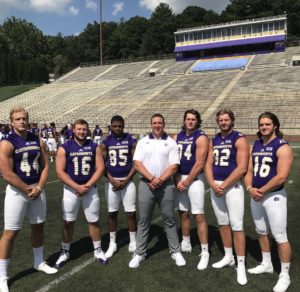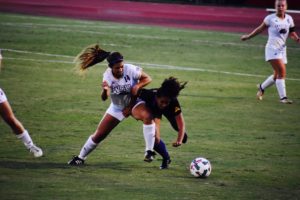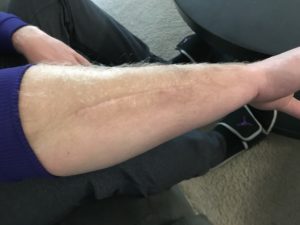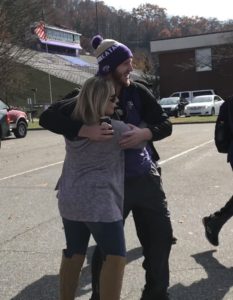Most athletes see injuries as a setback and a way to come back stronger in the game that they play and for the sport they love. For redshirt senior tight end, Tyler Sexton, football seasons come to an end way too quickly and sometimes without even getting to step on the game day field.

Sexton (82, second from left) on picture day before the 2017 season started.
Photo courtesy of Tyler Sexton.
Sexton is currently sitting out of his final season at Western Carolina University for a meniscus tear that happened on Oct. 7, in the game against Wofford.
“When I got hurt again, I just thought, wow again,” said Sexton. “I understand it’s a sport and injuries happen but this is the fifth surgery and I am just questioning what I am doing that keeps getting me hurt.”
As an athlete, you do not expect to get hurt, but it sure is a possibility and something they keep in mind when going onto the field or their arena of play.
Anna Mellis , a senior WCU soccer player, has torn her ACL five different times all playing her sport but has consistently come back and returned to the field after healing and rehab.

Anna Mellis, during her 2017 season.
Photo by Becca Ross.
“Playing soccer you’re constantly cutting and there is a lot of intense contact so you expect to get hurt but you never want it to happen,” said Mellis.
With all sports you are susceptible to a basic injury like the well-known UCL tear in baseball that is treated with Tommy John surgery.
“Tommy John is a tough surgery to come back from but I’ll make a full recovery. However, without baseball and throwing the wrong way, I probably wouldn’t have had to have this surgery. But it’s a game that I love and I will just have to adjust,” said Trent Youstin, WCU pitcher who was cleared to play baseball again Monday, Oct. 23, after a year of recovery.
Currently at Western, there are many injured athletes who are either playing with their injury or sitting their season out. To put a number on the total is almost impossible, because every athlete does not report their injuries.
Sexton has been playing football since he was a sophomore in high school. He has since invested his time into the game topping out at seven years but says that he has spent a year and a half of that time hurt and not playing.
He signed from East Henderson High School with a dream of coming to college to get a degree in entrepreneurship. He always wanted to go into the NFL but it was not a high priority for him saying that if it happened then it happened. He did not know, though, that he was going to start getting injured and having five surgeries as his time went on in the sport.

The scar left on Sexton’s forearm after the ulna break and surgeries.
Photo by Becca Ross.
Sexton’s first injury in the sport was breaking his ulna in two places during his junior year and 2015 season. After the ulna break, he developed an infection from the plate they used in his arm. He said that he was not discouraged after the first injury because it was just a break and he would recover quickly from that. Then the infection happened and everything changed.
“They had to put a picc line in my arm and they told me to just sit on the couch. I couldn’t do any activities; sweat or anything. I just sat up on the couch and gained like 40 pounds because I wasn’t moving any. Recovering from the break is what discouraged me and made me lose a little bit of the dream,” said Sexton.
Sexton is on a scholarship at WCU so he was still able to come to Western and continue his education while he healed from all of his injuries which have grown over the years to seven total. The university cannot take the scholarship away, especially after you sign, so athletes have the ability to continue their education even after a season ending injury.
“I saw two injuries in college football athletes that were career ending. One was a cardiac issue and one was a neck injury and both players were fortunate with that they lived,” said Daniel Holchin, Wofford athletic trainer. “Both were told they couldn’t play football anymore so they were upset about that but also they realized they were lucky to still be alive. One athlete was kind of pushing for the doctors to let him come back to playing but realized that it wasn’t best for his health.”
The NCAA protocol has final say on the doctors and trainers who have final say on who plays and who doesn’t. WCU does not have a set policy to follow other than what the athletic trainers and doctors say to do.
Western has an agreement with Harris Regional Hospital where the orthopedic surgeons come from and have standard hours in the WCU training room so they can see student athletes on campus and at their office in Sylva.
“We are lucky to have the hospital here locally or else we would probably be going to Asheville or maybe even Franklin for all the injury needs. The care on campus here is excellent, the OR’s and rehab facility that they built and partnered with the university up at HHS have really helped our student athletes,” said Athletic Director, Randy Eaton.
Care long term for Sexton will probably result in having a knee replacement on his left knee.
“They told me I could possibly have complications like when I get older, but I hope medicine is good in the next 30 years,” said Sexton.
He says he is only worried about his knees because his arm and other injuries have healed and do not cause him any trouble.

Sexton in his final walk as an athlete on Nov. 11 2017.
Photo by Becca Ross
Dreams come and go throughout your life. Sexton said he realized his dream of going to the NFL is gone, so now he has shifted his dreams into a more realistic one. The new dream includes working on graduating in December with a degree in Entrepreneurship.
Sexton took his final walk as a student-athlete on Saturday, November 11 and said with a smile that he will be pursuing a secret plan after graduation. For now, Sexton is resting up from his meniscus surgery and hoping to take his walk, not hobble as a student across the stage on Dec. 16.


